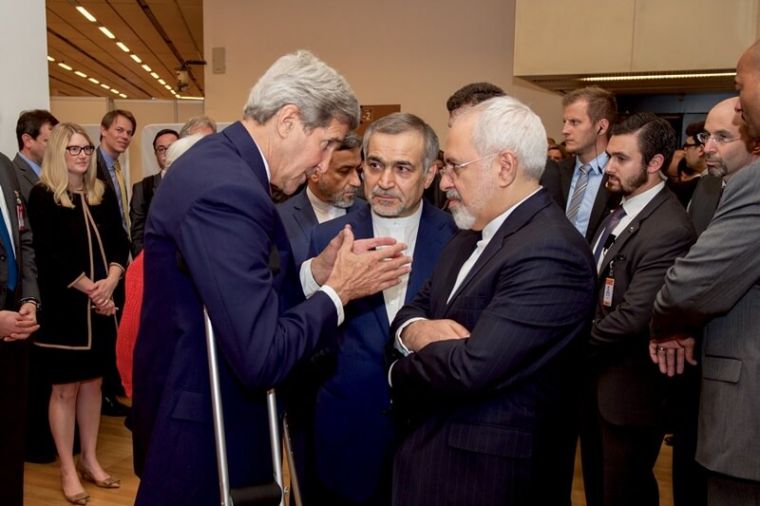World powers' deal with Iran to ignite Mideast nuke arms race, officials warn

The landmark nuclear accord hammered out by Iran and six major world powers will trigger a nuclear arms race in the Middle East and give Russia the opening to exert its influence in the region, former and current US government officials warned.
This scenario was far from what US President Barack Obama had in mind when his team of negotiators led by State Secretary John Kerry made the deal with Iran on Tuesday. Following the announcement of the agreement in Vienna, Austria, President Obama lauded the deal, saying in a statement that it has halted the spread of nuclear weapons in the Middle East. The deal suspended and restricted segments of Iran's nuclear program in return for the lifting of imposed sanctions that have crippled Iran's economy.
"We have given Iran the path it has been seeking for almost 35 years. The other states in the region are not going to sit idly by, which is why in effect the nuclear arms race is already underway," said former UN Ambassador John Bolton.
He noted that Iran and other countries have used civilian nuclear energy programs to masquerade their respective enrichment programs.
The nuclear agreement would also allow Russia, a builder of nuclear facilities, to exert more influence in the Middle East, Bolton said.
The last six months have seen Russia ironing out key nuclear bargains with long-time US allies in the oil-rich region, taking advantage of their distrust of Iran.
"Every Sunni Arab nation is going to see [a nuclear Iran] as an inevitable outcome," said Republican presidential candidate and Senator Lindsey Graham, R-South Carolina. "The worst possible outcome of the deal would be to create a nuclear arms race in the Mideast where Sunni Arabs feel threatened."
"Sadly, the Administration just lit the fuse for a nuclear arms race in the Middle East. We all know Iran's neighbours will not sit idly as the world's largest state-sponsor of terror becomes a nuclear-threshold state," said Republican Sen. Ben Sasse, of Nebraska in a statement.
Russia made a deal with the Egyptian government of President Abdel Fattah el-Sisi in February to help Cairo construct and operate its first nuclear reactor.
In the following month, Jordan penned a deal worth $10 billion with Russia to build the former's first nuclear power plant, with two 1,000-megawatt reactors in the country's north.
Just last month, Saudi Arabia and Russia clinched a deal, the terms of which are not disclosed. The kingdom, according to news reports, is planning to build 16 nuclear reactors, which Russia would have a key role in operating.
According to an unnamed intelligence officer who has just come back from the region, allies such as Egypt and Saudi Arabia felt abandoned by the US as the Obama administration showed its determination to reach a deal with Iran ahead of US allies in the region.
"The race is on, and the US has got to get in the driver's seat," said an intelligence official of the predicted regional arms race. "The administration has created a major void, allowing an opening for Russia."
Russian President Vladimir Putin lauded the landmark deal as a huge accomplishment, saying in a statement: "We expect that all the parties concerned, primarily the six states involved in the negotiations, will comply with the deal in full. ... Our bilateral relations with Iran will receive a new impetus and will no longer be influenced by external factors."
Meanwhile, Obama described the agreement, which will take months to be fully implemented, as a sign that US-led diplomacy can bring about "real and meaningful change," Bloomberg wrote.
"This deal demonstrates that American diplomacy can bring about real and meaningful change, change that makes our country safer and more secure," Obama said at the White House.
"We have stopped the spread of nuclear weapons" in the Middle East, said the president who then described the area "the most volatile region in the world."
White House spokesman Josh Earnest earlier said the government's plan was engineered to lessen the possibility of a nuclear arms race.
"One of the reasons we have sought to pursue diplomatic opportunities to prevent Iran from obtaining a nuclear weapon is the risk that exists that if Iran does obtain a nuclear weapon, it could set off a nuclear arms race in the most volatile region of the world," Earnest said in a response to a question about Saudi Arabia's intentions if no agreement was reached. "That would be destabilising to an already volatile region of the world. It also would have a negative impact on the national security interests of the United States. It obviously would not be good for our closest ally in the region, Israel."
Days before the agreement was struck, the Supreme Leader of Iran, Ayatollah Sayyid Ali Khamenei, reportedly told university professors in a speech on July 4 that Americans and Westerners are "terrorists."
"They [the Americans and westerners] themselves are terrorists. They themselves are opposed to human rights. Are they pressuring a country only for the sake of human rights? The issue is not this. There are more important calculations behind this issue. A people, a movement and an identity have come into being that pivot around principles opposed to those of global arrogance and the oppressor-oppressed system. They do not want this to develop. We are in such a condition. We are in such a position. Therefore, we should move forward and work hard."
In a related development, the Vatican welcomed the nuclear accord, with Pope Francis hoping to see the results of the deal will not only be limited to the nuclear sphere.
"The agreement on the Iranian nuclear program is viewed in a positive light by the Holy See," said Vatican spokesman Fr. Federico Lombardi SJ in a statement on Tuesday, shortly after the agreement was announced.











